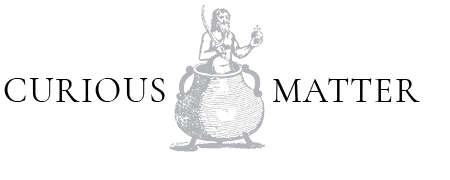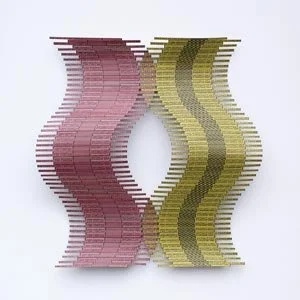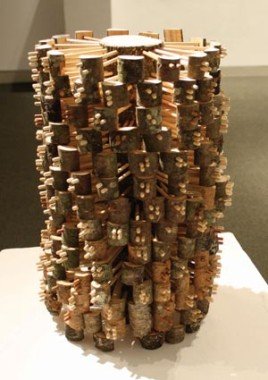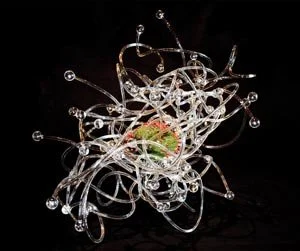Terra Incognita
May 18 – June 22, 2014
Christopher Gideon, Eye, 2012, vintage baseball cards from the artist’s childhood collection, 9 X 10 inches.
Ben Pranger, Countless Rings, 2008, wooden log and dowels, Braille text by Emerson, 7 X 11 X 11 inches.
TRAVELING TODAY is easy. We plan and we tour. We insist that our destination be picturesque, somewhat exotic, yet still offer familiar food and comforting amenities. We shake our fists in frustration at globalization while expecting it when we travel. We delight in finding the familiar comforts of home in far-flung ports –– as if we’re all just a Coke bottle away from global harmony.
Travel in the past was arduous, dangerous, and mainly for the daring or desperate. Stories abounded of distant lands with strange animals and mysterious people. These fantastic stories were corroborated by bestiaries and literature going back to Alexander the Great, inspiring adventurers to hie out and find the truth. What was beyond the horizon to the west, and Cape de Não to the south? It was thought the edge of the Earth lay to the west, and monsters ready to devour the foolish lurked in the southern waters. Those who tried to see for themselves never came back. Still, commerce and curiosity proved too beguiling. The Age of Discovery was born when Columbus braved the western route to find China and the Spice Islands. Instead, it wasn’t an edge to fall off, but the Caribbean Islands and a New World which lay in the way.
The phrase terra incognita was first used by Ptolemy in C. 150 AD in his Geography to indicate what may exist beyond the known territory. It found popular use with cartographers during the proceeding centuries to indicate, as Ptolemy did, land that was imagined to be in that particular place in the world. To Curious Matter, the notion of exploring uncharted territory of whatever topography seems the very essence of what artists do. Artists often grapple to visually articulate something unseen, unknown, murky or subconscious. Odilon Redon described his exploration of the interior landscape as an attempt to “place the visible at the service of the invisible”. The working of the brain and psyche continues to offer fertile ground for exploration into the unknown. Laurie Anderson, during her NASA artist-in-residency, was inspired by our ongoing fascination with space and its mysteries. She also recognized the link between research and beauty. Contemporary artists are making discoveries and documenting terrain in areas closer to home as well. Matthew Jensen, for example, through site-specific walking projects reveals unknown aspects of the landscape sometimes without leaving Manhattan.
Curious Matter presents the exhibition Terra Incognita, as an exploration of how artists traverse the unknown territory of their ideas; whether that be a physical place, a psychic state or the physical application of media.
Robin Sherin (Building Silhouette #2 and Building Silhouette/Horizontal #10), Lance Morris (Local Positioning System: Los Angeles Roundabout), and Emmy Mikelson (Threshold Composition B.), are all exploring the physical space of the world. Sherin and Morris find a sense of wonder in their well-used urban surroundings. They take their cues from street signs and architectural landmarks and search for adventure in the mundane. Mikelson, filtering her vision through Piranesi, reimagines her neighborhood by turning it back upon itself and plotting out that terrain.
Christopher Gideon (Eye) and Robert Gould (Ring of Rust) are time travelers. Gideon revisits his childhood obsession with baseball cards and reinvents them into graceful geometric collages. Gould, incorporating the very soil of an historic site, imbues his work with the essence and energy of the place he is depicting.
Ben Pranger (Countless Rings) finds visual inspiration from what can’t be discerned with the eye. His textual wood sculptures incorporate Braille, spelling out a text for those who have the understanding. Countless Rings conveys a text of Emerson, but the simple form and lush texture invites touching even for those who can’t interpret the projecting dowels.
Peter Matthews (A Volume of Ocean Knowledge) infuses his work with the mystical by binding together books that share the subject matter of the ocean. He then soaks them in the sea, hoping that the wisdom the books contain will also absorb the knowledge of the elemental water.
Lauren Orchowski (As Seen By A Free Falling Observer), Sarah Michalik (Complex Relations), and Claudine Metrick (Fire Flies) all take us on a voyage beyond this Earth. Both Orchowski and Metrick compose imagery that embraces the mystery and grandeur of the planets, the stars in outer space, and the forces of the universe. Michalik devises an entire swirling galaxy or perhaps a single atom with swirling electrons with her circling glass orbs. Atom or galaxy, the forces that hold the cosmos together seem to converge at the very spot of her work.
Each of us is on our own journey, and often several at once. We follow a physical path, where our footsteps lead us from one place to another, experiencing the world through our senses. We also follow a psychic path, where we are led by our inner selves, sometime consciously, sometimes not, tethered to some invisible pull, always arriving where we need to be. Artists have a further journey, to follow their inspiration and drive to create. For them, this is the true terra incognita, and the most exhilarating voyage of discovery of all.
The Artists
Arthur Bruso
Elaine Su-Hui Chew
Patricia Dahlman
Brian Edgerton
Johanna Evans-Colley
Christopher Gideon
Margot E. Glass
Robert Gould
Bo Kim
Joshua Liebowitz
Peter Matthews
Marianne McCarthy
Julie McHargue
Claudine Metrick
Sarah Michalik
Emmy Mikelson
Alexandra Momin
Lance Morris
Kirsten Nash
Lauren Orchowski
Gilda Pervin
Ben Pranger
Reparative History (The Dept. of)
Robin Sherin
Allison Spence
Amanda Thackray
Linda Tharp
James Wechsler
Sarah Michalik, Complex Relations, 2014, blown glass, flameworked glass, mixed media, 17 X 14 X 13 inches.
Claudine Metrick, Fire Flies, 2014, charcoal and mica powder, 12 X 11 inches.
Robert Gould, Ring of Rust, 2010, rust, soil, gouache, on ink jet print on Arches paper, mounted on plywood, 8.25 X 12.25 inches.





